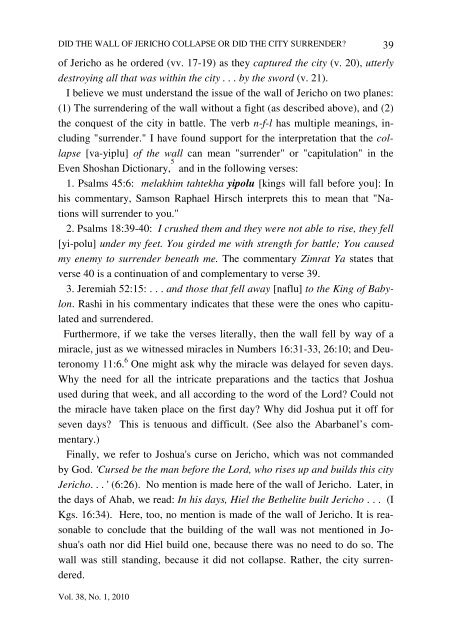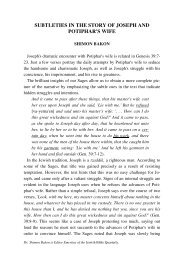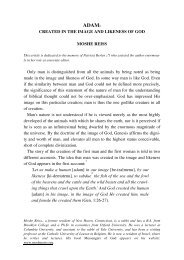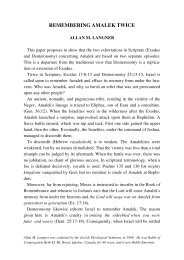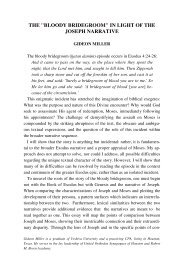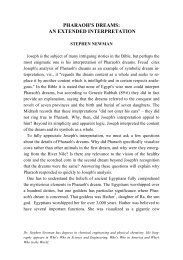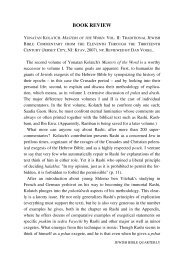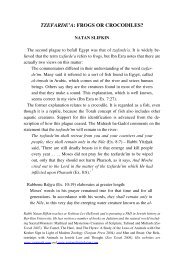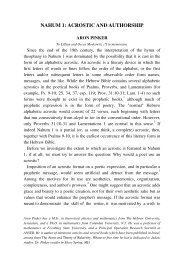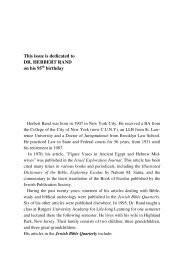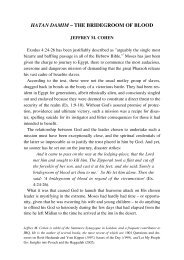did the wall of jericho collapse or did the city surrender?
did the wall of jericho collapse or did the city surrender?
did the wall of jericho collapse or did the city surrender?
You also want an ePaper? Increase the reach of your titles
YUMPU automatically turns print PDFs into web optimized ePapers that Google loves.
DID THE WALL OF JERICHO COLLAPSE OR DID THE CITY SURRENDER?<br />
<strong>of</strong> Jericho as he <strong>or</strong>dered (vv. 17-19) as <strong>the</strong>y captured <strong>the</strong> <strong>city</strong> (v. 20), utterly<br />
destroying all that was within <strong>the</strong> <strong>city</strong> . . . by <strong>the</strong> sw<strong>or</strong>d (v. 21).<br />
I believe we must understand <strong>the</strong> issue <strong>of</strong> <strong>the</strong> <strong>wall</strong> <strong>of</strong> Jericho on two planes:<br />
(1) The <strong>surrender</strong>ing <strong>of</strong> <strong>the</strong> <strong>wall</strong> without a fight (as described above), and (2)<br />
<strong>the</strong> conquest <strong>of</strong> <strong>the</strong> <strong>city</strong> in battle. The verb n-f-l has multiple meanings, including<br />
"<strong>surrender</strong>." I have found supp<strong>or</strong>t f<strong>or</strong> <strong>the</strong> interpretation that <strong>the</strong> <strong>collapse</strong><br />
[va-yiplu] <strong>of</strong> <strong>the</strong> <strong>wall</strong> can mean "<strong>surrender</strong>" <strong>or</strong> "capitulation" in <strong>the</strong><br />
Even Shoshan Dictionary, 5<br />
and in <strong>the</strong> following verses:<br />
1. Psalms 45:6: melakhim tahtekha yipolu [kings will fall bef<strong>or</strong>e you]: In<br />
his commentary, Samson Raphael Hirsch interprets this to mean that "Nations<br />
will <strong>surrender</strong> to you."<br />
2. Psalms 18:39-40: I crushed <strong>the</strong>m and <strong>the</strong>y were not able to rise, <strong>the</strong>y fell<br />
[yi-polu] under my feet. You girded me with strength f<strong>or</strong> battle; You caused<br />
my enemy to <strong>surrender</strong> beneath me. The commentary Zimrat Ya states that<br />
verse 40 is a continuation <strong>of</strong> and complementary to verse 39.<br />
3. Jeremiah 52:15: . . . and those that fell away [naflu] to <strong>the</strong> King <strong>of</strong> Babylon.<br />
Rashi in his commentary indicates that <strong>the</strong>se were <strong>the</strong> ones who capitulated<br />
and <strong>surrender</strong>ed.<br />
Fur<strong>the</strong>rm<strong>or</strong>e, if we take <strong>the</strong> verses literally, <strong>the</strong>n <strong>the</strong> <strong>wall</strong> fell by way <strong>of</strong> a<br />
miracle, just as we witnessed miracles in Numbers 16:31-33, 26:10; and Deuteronomy<br />
11:6. 6 One might ask why <strong>the</strong> miracle was delayed f<strong>or</strong> seven days.<br />
Why <strong>the</strong> need f<strong>or</strong> all <strong>the</strong> intricate preparations and <strong>the</strong> tactics that Joshua<br />
used during that week, and all acc<strong>or</strong>ding to <strong>the</strong> w<strong>or</strong>d <strong>of</strong> <strong>the</strong> L<strong>or</strong>d? Could not<br />
<strong>the</strong> miracle have taken place on <strong>the</strong> first day? Why <strong>did</strong> Joshua put it <strong>of</strong>f f<strong>or</strong><br />
seven days? This is tenuous and difficult. (See also <strong>the</strong> Abarbanel’s commentary.)<br />
Finally, we refer to Joshua's curse on Jericho, which was not commanded<br />
by God. 'Cursed be <strong>the</strong> man bef<strong>or</strong>e <strong>the</strong> L<strong>or</strong>d, who rises up and builds this <strong>city</strong><br />
Jericho. . . ' (6:26). No mention is made here <strong>of</strong> <strong>the</strong> <strong>wall</strong> <strong>of</strong> Jericho. Later, in<br />
<strong>the</strong> days <strong>of</strong> Ahab, we read: In his days, Hiel <strong>the</strong> Be<strong>the</strong>lite built Jericho . . . (I<br />
Kgs. 16:34). Here, too, no mention is made <strong>of</strong> <strong>the</strong> <strong>wall</strong> <strong>of</strong> Jericho. It is reasonable<br />
to conclude that <strong>the</strong> building <strong>of</strong> <strong>the</strong> <strong>wall</strong> was not mentioned in Joshua's<br />
oath n<strong>or</strong> <strong>did</strong> Hiel build one, because <strong>the</strong>re was no need to do so. The<br />
<strong>wall</strong> was still standing, because it <strong>did</strong> not <strong>collapse</strong>. Ra<strong>the</strong>r, <strong>the</strong> <strong>city</strong> <strong>surrender</strong>ed.<br />
Vol. 38, No. 1, 2010<br />
39


